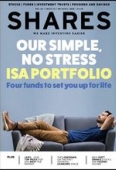Archived article
Please note that tax, investment, pension and ISA rules can change and the information and any views contained in this article may now be inaccurate.
Dual-class share structure may be an imperfect but necessary option

Food delivery platform Deliveroo (ROO) has put the backs up of a lot of investors, and not just because of its debut share price hammering that wiped £2 billion off its £7.6 billion starting valuation.
The company’s decision to adopt a dual-class share structure was a controversial one, giving co-founder and chief executive Will Shu greater control over the company. The system has a three-year shelf life but it was enough to for many major fund firms to pass on the IPO (initial public offering).
Twin-stock structures are nothing new but they are a rarity in the UK – THG (THG) is the only other example in the UK we can think of.
But they remain popular with founder-owned businesses in the US, particularly with many of the big tech IPOs in recent years. Facebook investors, for example, own Class A shares which carry one vote per share, while founder Mark Zuckerberg, and a handful of senior management are Class B owners, with 10-times the voting rights.
MODEL JUST ISN’T CRICKET
That artificial tilting of voting power is a difficult pill for most UK investors to swallow. One share, one vote has been sacrosanct in the UK and it strikes to the core of Brits’ sense of fair play. If management make a pig’s ear of value creation, investors can club together and throw them out, and get new people in to hopefully do a better job.
But what of the long term? There are good arguments that this can lead to ‘casino capital,’ where investor impatience means there is no room for short-term sacrifices made for longer-run gains, or perfectly good businesses are sold too early and too cheaply, denying some investors years of growth and compounded cashflows.
Think back to the summer of 2016 when the UK’s microchip designs champion ARM was sold to Softbank. Yes, the £32.3 billion deal meant investors cashed-in a 40%-plus premium to the then share price, but it is impossible to calculate the value that might have been created for shareholders had they taken a longer-term view. One fund manager admitted to Shares 18-months later that he ‘regretted’ selling, and there are probably many others.
NEW RULES FOR A NEW WORLD
This is particularly important today where new technology-led businesses are creating entirely new markets that need time to mature before their real profit potential can be realised. The UK is good at producing bleeding edge leaders; like Skyscanner, DeepMind and Babylon Health. Payments firm Stripe, started by two Irish brothers, was recently valued at $95 billion, the biggest ever private company valuation.
Dual-class share structures can give founders the time needed for their enterprise to flower without restricting their access to growth capital. The twin-share model is not perfect but if London is to attract such growth businesses when they eventually float, it may provide the owners with the flexibility they need to grow their enterprises into global giants like Amazon or Alphabet.
Important information:
These articles are provided by Shares magazine which is published by AJ Bell Media, a part of AJ Bell. Shares is not written by AJ Bell.
Shares is provided for your general information and use and is not a personal recommendation to invest. It is not intended to be relied upon by you in making or not making any investment decisions. The investments referred to in these articles will not be suitable for all investors. If in doubt please seek appropriate independent financial advice.
Investors acting on the information in these articles do so at their own risk and AJ Bell Media and its staff do not accept liability for losses suffered by investors as a result of their investment decisions.

 magazine
magazine








